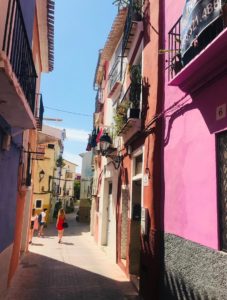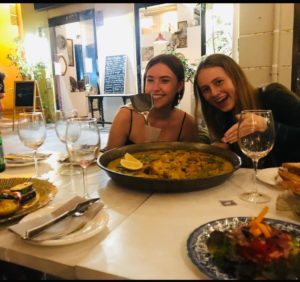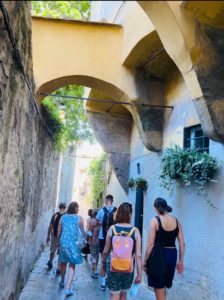Phew! My year… well… almost a year abroad is over! My 7 lovely months consisted of studying at a partner university in Spain, then jetting off to Italy for a work placement with a language school. I hadn’t originally planned on splitting my year this way, but long story short - covid and all its various obstacles led me to follow this particular path. In reality, I’m glad it unfolded this way. I was able to experience and learn from two completely different environments, and now I’m able to reflect on the positives and negatives of both.
You are probably reading this because you have been endlessly racking your brain about what to do during your year abroad, and are sick of the sight of those ‘pros’ and ‘cons’ lists you wrote for each option available. BUT HAVE NO FEAR! Before heading to Europe I gave myself a few rough goals, and below I have matched either ‘studying’ or ‘working’ as to which best fulfilled them. Hopefully, you have thought about what you most want to gain from your experience abroad, and this blog can help you make a more informed decision.
Just a note - these opinions are formed purely from my own experience, so please bear in mind that this is all very subjective! Also, given the pandemic, my circumstances were particularly unique and strange.
GOAL 1: MEET NEW PEOPLE FROM ALL WALKS OF LIFE… STUDYING
One aspect I loved about studying was how easy it was to meet new people, and a lot of people too. All my classmates were around my age, and generally eager to get to know the new ‘English’ student. By introducing myself to just one person, I found I easily met a handful more. Joining Alicante’s Erasmus group also proved really rewarding. Despite being from all different parts of Europe, in this community we were all part of one big (and slightly dysfunctional) family.
Of course, there is nothing stopping you from joining your city’s Erasmus group even if you are working, I just personally felt that being a student made it a little easier to integrate. With working, there also runs the risk that seeing the same faces every day could get a little stagnant, especially if there is no one you particularly ‘click’ with.

GOAL 2: IMPROVE LANGUAGE PROFICIENCY…WORKING
My language comprehension definitely improved the most through working at a foreign-language speaking office. I was required to write about complex topics in Italian, translate documents, and gain more exposure to the formal register (the most confusing thing I swear!). The biggest difference I also noticed between studying and working was when it came to speaking my foreign languages. As a student, I spent most of my day behind a laptop, listening and writing notes. But when I stepped into the office, I was speaking non-stop, either by phone or in-person. This helped me to form verbs and phrases with way less hesitation, so turns out small talk isn’t so bad after all.
GOAL 3: MAKE THE MOST OF THE CITY AND CULTURE…STUDYING
On reflection, I was really able to delve into the culture and society of where I was studying in Spain (pandemic permitting, of course). I had the freedom to do so, given the weekdays were not strictly regimented. The Erasmus group also offered many cultural experiences and visits that I may not have had the time to participate in if I were working. The 9 to 5 in Italy meant most of my exploring was limited to the weekend, but obviously not all work schedules will necessarily be like this.

GOAL 4: PUT KNOWLEDGE INTO PRACTICE…WORKING
Obviously, a year abroad in any capacity will require you to utilise skills like problem-solving, time management… etcetera, etcetera. However, it was only when I began working that I was able to put my skills and knowledge into real-life practice. For example, in Spain I studied a marketing module. However, it was at the Italian school that I got to produce marketing-based material for the first time. Another example: I studied translation during 1st and 2nd year, but during my work placement I was able to translate real content for the school that they needed for their website. As an employee, I was using my knowledge to really contribute towards something, and that felt particularly gratifying.

Here are some other positives and negatives of both studying and working to consider...
Studying
- The atmosphere of a university campus and lecture-style teaching are familiar, regardless of what country you’re in.
- Dealing with the university’s Erasmus administrators could be very, very s l o w, and require a lot of chasing up!
Working
- Most likely, when the workday is done, THE WORKDAY IS DONE! As soon as I left the office I had the time to just relax and enjoy the beautiful city, without thinking about assignments and deadlines.
- The idea of having a salary is great, but in most cases it is just pennies, or even unpaid (like mine ☹).
Overall I can’t stress enough how much I loved my time in Europe (even during a pandemic!) and I am glad I got to experience what it was like to both study and work abroad. I gained so much from both experiences in different ways- and I feel like a more resilient, well-rounded person going into my fourth year! Regardless of how you choose to spend your time abroad, one thing is for certain: you are going to love it!
Go and make the most of every experience and live la vida loca! 🙂
Amelia

Respond
